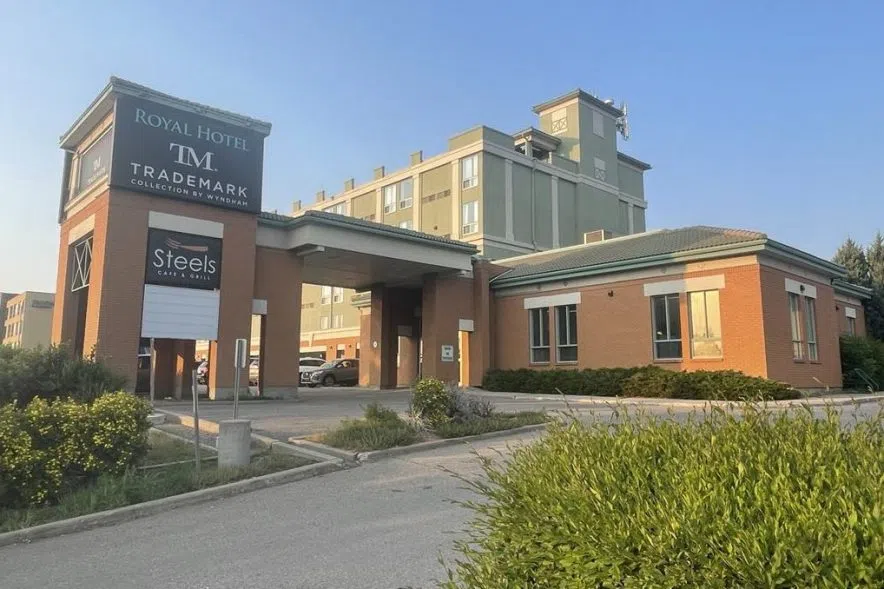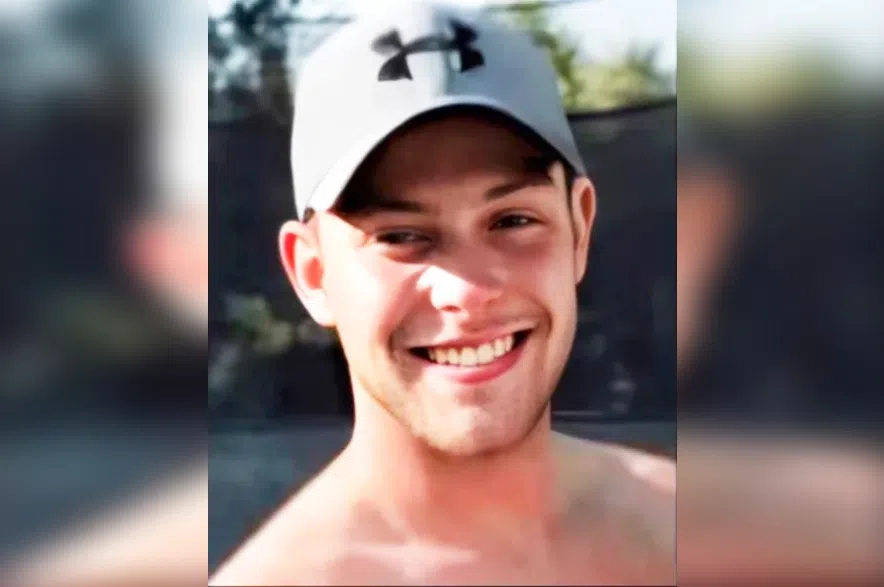Ryan Booker’s mother put her head in her hands and sobbed when constable Braeden Loney told the jury he found no bullets in the rifle he pulled out of her son’s car.
“It just doesn’t make sense,” Barry Nosal, Booker’s father, said from the gallery on the second day of the inquest into his son’s death.
Read More:
- ‘He was loved’: Family members of man fatally shot by police testify at inquest
- Police plane, dogs used to arrest pair in Regina
- Upgrades to courtyard at Regina General Hospital offer space for healing
Booker, 26, was fatally shot by police after a six-hour standoff and car chase on Highway 1 on July 17, 2022.
The first day of the inquest heard from Booker’s family members, who said he was struggling with drugs and mental health problems in the time leading up to his death.
The inquest’s purpose is not to assign guilt, but to have a jury determine the cause and manner of Booker’s death and make recommendations to prevent similar deaths from happening in the future.
On Tuesday, the jury heard from officers with both the RCMP and Moose Jaw Police Service.
Constables Braeden Loney and Burton Steele, with the RCMP’s emergency response unit, were both at the scene when Booker was shot.
Steele was assigned as a sniper, and was stationed 70 metres from where police had boxed in Booker with their vehicles on Highway 1.
Using a drone flying over Booker’s car, Loney said officers could see that Booker had rested the rifle up against the window frame of the vehicle, pointing towards the sky.
Loney was behind the wheel of an armoured vehicle, stationed behind Booker’s car.
The standoff on Highway 1 began around 5 a.m., according to Steele. Steele said at one point he was informed that Booker had spotted him.
Around 7 a.m., Steele said he watched the barrel of the gun come out of the window of the car, pointing in the direction of Steele and police vehicles.
“Either one of us could have been at risk of being shot,” Steele testified.
Steele said he made the decision to shoot Booker based on the threat to the safety of the officers.
Loney said he also saw the barrel of the gun move out of the car window.
“It levelled into what looked like a shooting platform,” he said. “That’s when I saw the window shatter.”
Steele said he shot Booker through the neck through a rear window of car. Steele said he aimed the gun at Booker’s head, which was the only part of him he could see.
To get Booker away from the firearm, police used a dog to try and remove him from the vehicle. Loney said the dogs were unsuccessful, and two officers ultimately dragged out Booker from the car.
Loney said he removed the firearm from the vehicle, but found the gun was not loaded. Steele said he didn’t know the gun was unloaded at the time.
“I am just finding out that information today,” Steele said.
Upon hearing that there were no bullets in the gun, members of Booker’s family began sobbing, signalling coroner Aaron Fox to motion for a break.
There was no confirmation on Tuesday about whether or not any ammunition was found inside Booker’s vehicle.
Booker ‘felt like the walls were closing in,’ crisis negotiator says
The Moose Jaw Police received a call at around 1 a.m. on the day of the shooting, alleging that a man was driving to the Superstore parking lot in that city with a plan to confront and harm his partner as she returned from the Country Thunder music festival.
Officers were sent to the parking lot, where Sergeant Jason Watt said there were more than 500 vehicles. The parking lot was full because it was the drop-off point for a shuttle taking festival-goers to and from the Craven Valley.
Watt said police quickly found Booker’s vehicle using information from the dispatch operator.
He said the officers tried to execute a “high-risk vehicle stop,” taking cover behind a police vehicle and instructing Booker to throw the keys out the window.
The next several hours were spent in a standoff in the parking lot.
Based on information from the dispatch operator, police identified Booker very quickly and got his phone number. Staff sergeant Kevin Pilsworth, a crisis negotiator, phoned Booker during the standoff.
“He was very open to conversation,” Pilsworth told the jury.
Pilsworth said Booker was not displaying any of the highly emotional reactions he typically sees in these situations.
“He didn’t get upset,” he said. “He made it quite clear he was going to stay there until he got to talk to his girlfriend.”
Pilsworth said he spoke with Booker in 10-minute sessions, calling in extra help from the RCMP, including the canine unit and people to operate drones.
Constable Jay Sills was called in to work as the lead crisis negotiator during the standoff. He said many of his conversations with Booker surrounded suicidal thoughts and concerns he had about surrendering.
“He said ‘I’m not going to jail and I’m not going to the hospital,’” Sills said.
Sills said Booker talked about being angry with his parents, and claimed he was frustrated because he was being prevented from seeing his kids.
Several hours into the parking lot standoff, Watt said other officers suggested Booker may have be trying to get police to shoot him in a “suicide by cop” situation.
At around 4 a.m., witnesses said Booker began to inch the vehicle forward. He eventually managed to drive from the parking lot, avoiding spike strips set up by police, and headed east onto Highway 1.
After travelling several kilometres out the city, Watt said Booker turned around, driving to the home of Kaitlyn Hofer, his fiancé. He passed by the home and returned back to Highway 1 near Belle Plaine, where he stopped the vehicle at around 5 a.m.
Sills said he spoke with Booker on and off over a period of about five hours.
“I would say he became what we refer to as ‘closure motivated,’” he said.
He said Booker would begin to take steps towards surrendering, but then “he would almost become upset with himself that it was happening.”
“It’s very difficult to talk to someone in that circumstance,” Sills said.
Sills said Booker threatened to shoot the drone overhead, but he eventually managed to convince Booker to throw the keys out the window of the car.
Sills said Booker began to panic while he was surrounded by multiple police vehicles.
“He was crying and upset, almost like the walls were closing in,” he said.
Sills said Booker hung up on him during their last call, and a short time later he was informed that Booker had been shot.
The negotiator said he “wracked his brain over and over again” trying to think of a way that he could have improved the situation.
“I used all the tools in my toolbox in the negotiation,” he said.
Sills said it was difficult to resume work for a while after Booker’s death.
“It bothered me for quite some time,” he said.
The inquest will resume on Wednesday.












